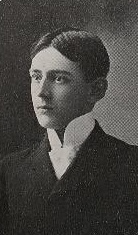Our Story. Our Growth. Our Impact. is a web series highlighting the rich history of Grand Rapids Public Schools.
GRAND RAPIDS, Mich. (GRPS) -- He was once described as "the only Senator who can strut sitting down." Arthur Vandenberg proved to be a man who came along at just the right time to make a difference in how the United States presented itself on the world stage.
Born in Grand Rapids in 1884, Vandenberg's life took one fascinating turn after another. When his father's business was bankrupted by the financial panic of 1893, the nine-year-old took on whatever jobs he could to help his family stay afloat.
 When he was barely 15, Vandenberg entered Grand Rapids High School, now known as Innovation Central High School. He gained attention as a writer and an award-winning orator, so much so that some classmates wondered if he was ever going to stop talking.
When he was barely 15, Vandenberg entered Grand Rapids High School, now known as Innovation Central High School. He gained attention as a writer and an award-winning orator, so much so that some classmates wondered if he was ever going to stop talking.
Following graduation, he took on a series of small jobs, losing one when he was fired for leaving his post to see his idol, President Theodore Roosevelt, in a parade. Not long after, he was hired by the Grand Rapids Herald. By age 22, he was the paper's editor. He wrote stories and books, made grand speeches, and bought other papers along the way.
Vandenberg's increased wealth gave him the opportunity to take on leadership roles in the Republican party. He got his dream job in 1928 when he was chosen to fill the term of a U.S. Senator who died in office. Vandenberg won re-election and kept his seat until his death in 1951.
While his Republican peers often complained about his long speeches and his reluctance to follow a hard party line, Vandenberg consistently voted with a "country first" ideology. He opposed much of Franklin D. Roosevelt's New Deal agenda, yet supported programs such as the Civilian Conservation Corps and basic relief efforts. He even one-upped the president by arguing for the Federal Deposit Insurance Corporation (FDIC) that insured bank solvency.
Vandenberg's political mettle was severely tested as war raged overseas. He strongly believed in neutrality and opposed U.S. involvement beyond financial support. He changed his mind after the attack on Pearl Harbor and became a leader in lobbying for America to collaborate with other nations to maintain peace. His impassioned speech supporting the establishment of the United Nations was dubbed "The Speech Heard Around The World" and served as the rallying cry for U.S. participation.
Twice married and the father of three, Vandenberg often came off as lone and unconfiding, even to his own family. On the day after Vandenberg's death, General Douglas MacArthur got a standing ovation from a joint meeting of Congress. Columnist Drew Pearson, one of Vandenberg's harshest critics, wrote "in my opinion, Vandenberg's contribution to world peace was far, far greater than anything the glittering general has given the world."
Article by GF Korreck
Sources: Arthur Vandenberg The Man in the Middle of the American Century, Hendrik Meijer, The University of Chicago Press, 2016; Spartacus Educational.com.
Image: Courtesy of the Grand Rapids History Center






